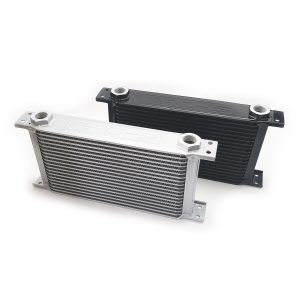Oil Coolers
- Oil Coolers
PRO-S High Performance Oil Cooler 10 Row
Rated 0 out of 5€168.50 incl. VAT Select options - Oil Coolers
PRO-S High Performance Oil Cooler 19 Row
Rated 0 out of 5€267.62 incl. VAT Select options
Why your car needs an oil cooler in top shape?
Oil coolers are a vital part of any vehicle. Its purpose is to cool the oil as it passes through the coils. The oil coolers are likened to small radiators in front of the engine’s cooling system. The oil coolers are integral part of extending the engine’s life, as well as the oil that passes through the vehicle. Because engines are subjected to extreme temperatures up to 180 to 200 degrees which they create and depend on transmission fluid to be cooled, the oil that passes through also lubricates cools and cleanses the engine.
As the oil completes its cycle through the coolers, heat is protracted and released through the external fins and thus dispersed by the air flow. Oil coolers are usually used as an additional component to the vehicle’s transmission.
Oil cooler systems were only really used in the 70’s when manufacturers saw the need to lower internal temperatures as the spaces where engines were placed were reduced in.
Why oil coolers are important?
Oil coolers act as cooling radiators for the vehicle. But there’s more to their importance than what meets the eye.
- Maintain oil quality
Because engines generate such extreme temperatures and when it does go beyond the normal operating temperature, the engine oil faces faster deterioration. While oil does have a set lifespan, the lubricants and detergents break down with continued usage. While regular oil changes helps with lubricating, oil coolers also reduce the operating oil temperature as much as 30%, thereby increasing its lifespan.
- Extend engine’s lifespan
Certain engine types require the oil that cycle through them to keep cool. Variations of these engines include water-cooled models and air-cooled models that use the air cleaner as a pathway for the oil to pass through to reduce internal temperatures. But even with this given type of motor, an added oil cooler system will help drop temperatures even more and in turn, extend the engine’s operational ability.
- Perfect for bigger vehicles
And when we say bigger vehicles, we mean motor homes and trucks. Oil cooling systems that are purchased as an afterthought succeeding the vehicle is usually no problem to find for these types of motors. Oil coolers are easily built in because these vehicles are designed to accept them. Oil coolers will also do wonders for heavier vehicles whose weight puts more strain on the engine’s operation. However, smaller automobiles that are normally used for home may have a problem installing these oil cooling systems and will need a bit of DIY fixing to fit them in.
Disadvantage of oil coolers
While a typical vehicle will need five to eight quarts of oil depending on the engine’s size, installing an oil cooling system in the engine may add a need for more oil to fill in the coils and pathways it will cool. In fact, it is estimated that the vehicle will need about two quarts more oil with every oil change. Although this may seem a bit much added to your vehicle’s actual oil demand, just remember that with an extended oil lifespan, you’ll be changing the oil less and less.



